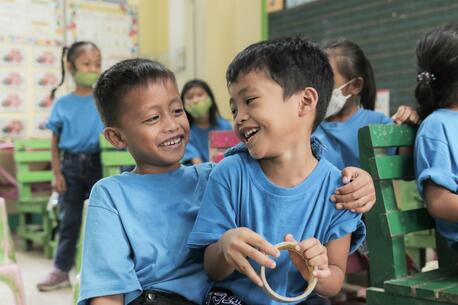The Fight Against Online Child Sex Trafficking
Ask Congress to Help Stop Online Child Sex Trafficking.
As it stands, U.S. courts have ruled that it is legal for computer providers to permit child sex trafficking on their websites. No scenario demonstrates this harrowing reality better than the ongoing battle against Backpage.com.
Backpage was once the world's second-largest classified advertising website, but activity on its “adult ads” section placed it at the center of a Senate investigation in 2016. The corresponding Senate report, titled Backpage.com's Knowing Facilitation of Online Sex Trafficking, indicated that Backpage was actively facilitating and profiting from online child sex trafficking. A separate report found that the site was also using a proxy company in the Philippines in order to seek out sex traffickers by “contacting people who posted sexually explicit ads on rival escort sites and offering them a free ad on Backpage.”
Despite the evidence and the numerous attempts to sue Backpage – chronicled in the movie I Am Jane Doe – the site has not been held accountable. These failed attempts to hold Backpage to task exemplify a reality in which there is a high reward (exorbitant profits) with little risk when it comes to online child sex trafficking in the United States. That is unacceptable, especially in light of the fact that 92% of all child sexual abuse URLs are hosted by 5 countries in the world, one of which is the U.S.
Courts ruled that websites like Backpage are protected by a specific section of the Telecommunications Act of 1996, known as the Communication Decency Act (CDA). Section 230 of the CDA provides “interactive computer service providers” (ICSP’s), such as Backpage, Google, Facebook, Craigslist, etc. protection from liability for activity conducted by third-parties. This, for example, protects ICSP’s from liability for a chair that was stolen and then posted for sale on their site. That part makes sense. In fact, in most cases, this legal provision has played an important role in the growth of the internet. Its “Good Samaritan” provision further encourages ICSP’s to take action against content that is “obscene, lewd, lascivious, filthy, excessively violent, harassing, or otherwise objectionable.” However, courts have ruled that this liability shield also protects ICSP's that knowingly and actively facilitate child sex trafficking. That is a problem, and it is what the Stop Enabling Sex Trafficking Act of 2017 (SESTA) seeks to amend.
SESTA would amend Section 230 of the CDA so that any ICSP which “assists, supports, or facilitates” child sex trafficking can be held accountable. It does so with carefully crafted language which clarifies a clause within Section 230. The amendment asserts that the CDA should not “impair the enforcement of, or limit availability of victim restitution or civil remedies under, state or federal criminal or civil laws relating to sex trafficking of children or sex trafficking by force, fraud, or coercion.” It would also create a uniform standard for criminal charges based on federal human trafficking laws.
The amendment initially faced some criticism from organizations that feared it may punish ICSP’s for taking action against traffickers within the scope of the “Good Samaritan” provision. Lawmakers listened to those concerns, and made a point to clarify the language. Consequently, the Internet Association, which includes Google, Amazon, Lyft, Facebook, Yelp, and others, issued a statement in support of SESTA. As stated by CoStar CEO:
“As a technology company, we believe in, and have benefitted from, the growth of the Internet. We understand that an unregulated Internet provides fertile ground for the development of important new and innovative business models, and we will continue to strongly defend that openness. But when we see those driven by greed take advantage of that freedom by facilitating underage sex trafficking, we cannot be silent.”
Passing SESTA would send a strong message to ICSP's that participating in online child sex trafficking is not only immoral, but illegal. A March 2016 ruling in Backpage’s favor stated that this problem must be remedied “through legislation, not through litigation.” Congress has answered that call with SESTA, now let’s work together to pass it.
TAKE ACTION
- Tell your Senators that you support SESTA.
- Participate in Freedom Day on February 1st by raising awareness about child trafficking on social media and tell your representatives to support the Stop Enabling Sex Traffickers Act (SESTA). Be sure to use our hashtags #10MillionTooMany and #ExpressNotExploit and tag us @EndTraffick in your posts!
- Check out the State of the World's Children report to see what UNICEF is doing about child safety in the digital age.
- Many children are exploited in the production of our clothing. Where was your shirt made? Your pants? Check your label, and do some research on where your clothing comes from. Take this a step further by setting a New Year’s resolution to only buy secondhand or ethically-sourced clothing.
- Challenge yourself to buy ethically sourced food. A Fair Trade certification verifies that the supply chain is exploitation-free. Start by purchasing one item (chocolate, coffee, tea) and working up from there.
- Ask to have the National Human Trafficking Hotline posted in shops, restaurants, and schools in your area.
Learn more about child trafficking and how to spot the signs at www.unicefusa.org/endtrafficking.
HOW TO HELP
There are many ways to make a difference
War, famine, poverty, natural disasters — threats to the world's children keep coming. But UNICEF won't stop working to keep children healthy and safe.
UNICEF works in over 190 countries and territories — more places than any other children's organization. UNICEF has the world's largest humanitarian warehouse and, when disaster strikes, can get supplies almost anywhere within 72 hours. Constantly innovating, always advocating for a better world for children, UNICEF works to ensure that every child can grow up healthy, educated, protected and respected.
Would you like to help give all children the opportunity to reach their full potential? There are many ways to get involved.





